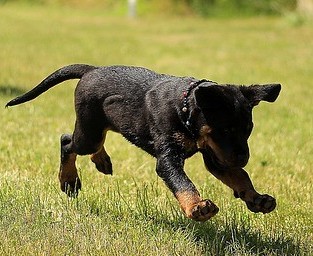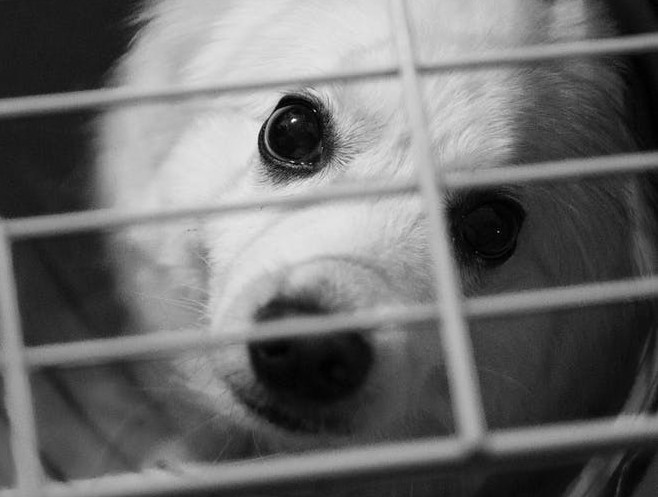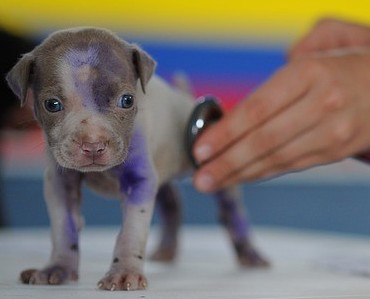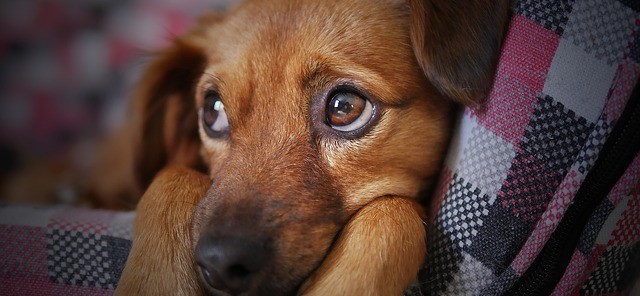There is nothing sweeter or more adorable than a puppy until you run into puppy potty training problems. When the adorable fur-ball has covered your house in a foul-smelling mess they get slightly less adorable. Okay, they may still be really adorable but the pee stain on the carpet or gag-worthy poo on the floor makes your home less adorable.
Avoid some common mistakes to make potty training easier and faster.
1. Not Supervising the Puppy
A general rule for how many hours your puppy can hold their bladder is however many months old they are plus one. For example, a 3-month-old puppy could possibly make it 4 hours. This depends on the puppy. Every puppy is different and when starting out I recommend you don’t try for the max number of hours right away that’s just asking for a mess to clean up.
Puppies aren’t great at holding their bladder and need to be watched when roaming free in the house. It is best to keep them in the same room as you or on a leash next to you, so you can watch them close.
Anytime their little bladder starts to fill your floors are at risk (also your lap, crate, and furniture). If a puppy has gone outside and emptied its bladder and bowels fully, there is a good possibility you have around 30 minutes where your house is semi-safe from a puddle of pee or poop pile. Again this depends on the puppy but generally, this time is pretty safe.
Past this time the chances of an accident increase. It is best to keep the puppy with you. Holding the puppy, playing with them, or having them on a leash near you are good options. If the puppy starts wandering off and sniffing take them out immediately.
If you can’t have your adorable little fuzzball near you, they should be crated in the correct sized crate. Make sure your puppy is used to the crate and keep crate time short.
2. Waiting to Long
As I said before, don’t try to wait the max time possible to take the puppy out. Taking them out more often especially at first can help them catch on.
If people are constantly set up to fail, they get discouraged and stop trying. The same goes for your puppy.
Make it easier for your puppy to succeed and harder to fail. It’s your job to teach them, so be a good teacher and make it as easy as possible for them to learn.
If accidents are frequent, watch your puppy close and take them out every hour, or half-hour if needed. Too many accidents can be confusing for a puppy and can make training take much longer.
Use a crate but keep crate time short. Crating should be used for as short of time as possible. Try not to push your puppy to hold it for the max amount of time when in the crate. If they have too many accidents in the crate they may get used to going in the crate.
All dogs typically want to avoid going to the bathroom where they sleep but can get desensitized to it, if it happens too often.
If you’re not going to be able to keep crate time short it may be best to not use a crate.
3. Not Having a Schedule
When first starting out potty training, create and stick to a schedule as best as possible.
There are key times to make sure you take your puppy out. Take them out:
- As soon as you get up in the morning
- After meals and water
- After waking up from a nap
- After a playtime or training
- Anytime your puppy starts sniffing around or starts wandering off
Have a scheduled time for food and avoid free feeding. Puppies usually do best being fed about 3 times a day. Having food available constantly can make potty training hard and unpredictable. If you’re having issues water can be limited or offered on a schedule until your puppy is fully house broke.
Try to stick to a consistent schedule as much as possible. Sleeping in on days off is great unless there is a puppy pee puddle waiting for you as soon as you open your eyes.
Keep everything consistent while training. Life happens and it may not always be possible, but consistency will make the training go faster. Keep things consistent by:
- Taking them out at the same times each day
- Using the same door to take them out each time
- Having the same “potty spot” outside every time you go out
Puppies do better with consistency and learn quickly what to expect.
4. Punishing for Accidents
When an accident happens don’t yell or punish the puppy. “Rubbing their nose in it” doesn’t help (and GROSS if anyone literally does that).
If you catch them in the middle of producing a puddle make a noise to distract them, but not scare them. Try clapping your hands to get their attention and interrupt them. As soon as they stop, take them directly out to the potty area. If they finish outside praise them after.
Puppies and dogs don’t think the same way as people: Puppies may start to relate going potty to getting yelled at. They may not understand you’re not yelling at them for going potty; you’re upset at where they went.
Puppies who are punished when they have an accident can start to sneak off and go potty in the house where no one can see them.
They may even start to take a long time when brought outside to go potty. They may not want to go in front of anyone thinking they will get in trouble.
5. Not Cleaning up Accident Correctly
When there is an accident make sure to clean it up properly. A dog’s sense of smell is much better than a person’s sense of smell. It may not smell like puppy pee to you but to them, it smells like the perfect place to go again.
Make sure to get a cleaner with enzymes specifically for urine to clean with. This is especially true with carpets. An accident on the carpet can be very difficult to get the smell out.
If there are consistent accidents on the carpet and an enzyme cleaner isn’t helping, it may not be enough. Shampooing the carpet with a machine may help.
There are machines that can be rented, you can hire someone or buy a good carpet cleaner yourself. Just make sure the cleaner used is one that has an enzyme to really get the smell out.
Another option is trying to avoid carpeted areas until your puppy is fully potty trained. Carpet can be confusing and feel similar to grass to a puppy.
6. Accidents at night
Keep the puppy where they can be heard. If they whine and wake you quickly take them out. If you don’t wake up to the puppy it may be necessary to set an alarm and take them out on a schedule at night for a while.
Most of us don’t enjoy getting up every few hours to take a puppy out in the middle of the night so there are a few things that can increase the time between needing to go out.
- No food or water 2-3 hours before bedtime. Use common sense if your puppy is playing hard and thirsty make sure to give them water before bed. You don’t want a dehydrated puppy.
- Exercise your puppy during the day so they are tired at night
- Crate them at night. Make sure the crate is properly sized
- Have bedding in the crate but nothing to absorbent that the puppy can use and push to the side.
- Make sure to take the puppy outside before bed
If your puppy is already having accidents in the crate and lying in it, they are most likely desensitized to it. You should set an alarm at night and keep to a schedule.
Some puppies may learn they can go potty on the bedding and push it to the side. If this happens, avoid absorbent bedding until your puppy is housebroken or learns to hold it in the crate.
Within a week or two, your puppy should be able to make it 6 hours at night and 8-10 by the time they are six months. Again this depends on the puppy but gives a general idea what to expect.
7. Distractions and Praising to Soon
There are so many things to see and smell outside for your puppy. A squirrel running by, a bird standing in the yard, your neighbors dog who barks nonstop, kids playing or a car driving by. It can all be very distracting and, if their bladder isn’t full these things can be much more interesting than stopping to pee.
Try to have their potty spot in an area away from distractions and keep things boring. With nothing else better to do, your puppy is more likely to go.
When your puppy does go to the bathroom, hold the applause until after they are done. Telling them how good they are mid squat can distract them before fully emptying their bladder and lead to an accident in the house shortly after going inside.
You can start to use a cue for your puppy to go potty. Pick whatever word you like. Many people simply use “go potty”. When your puppy goes potty calmly say “go potty” while they are going. Don’t get too excited saying the command else it may distract the puppy.
After they are finished, make sure they are fully finished, praise the puppy. Continue saying “go potty” while your puppy is going for several days.
You can eventually try taking your dog out to the potty area and giving the command. If they go praise them after. If they don’t go, DO NOT repeat the command! This is a bad habit to get into. Simply go back to saying the command word calmly when the puppy goes for several days before trying again.
Once your puppy learns this, it can be useful if traveling with your dog or taking them out in bad weather. No one likes to stand in freezing cold rain and if your puppy can understand what you want them to do, you both can get inside quicker.
8. Leaving Them Outside on Their Own

Simply putting your puppy outside doesn’t mean they are going to go to the bathroom on their own.
Never assume they have gone unless you have witnessed it. While training, do not put your puppy outside alone. Especially if the weather is bad, chances are they will sit by the door waiting for you to let them in again.
Without you there the puppy may get distracted exploring, playing, or even anxious about being outside alone and not go potty.
A puppy isn’t going to go to the bathroom unless they are relaxed. If you don’t go with them, they may not relax enough to do their business.
As much as you don’t want to stand in the rain waiting for your puppy to poo it’s most likely necessary at first.
9. Not Giving Your Puppy Enough Time
Having a puppy pee as soon as you bring them inside from an unsuccessful trip to the potty area is frustrating. Don’t always expect instant results, it may take 5-10 minutes.
If you have ever had your puppy have an accident five minutes after taking them out chances are you didn’t stay out long enough.
Puppies usually need a little extra time to fully empty their bladder. Accidents a short time after your puppy has went potty outside may mean you should stay out a little longer with them. Give them 10 min when you take them out, they may end up going potty twice before coming in.
Take a chair and sit by the potty area, if you sitting is not too distracting for your pup. If sitting turns out to be distracting try walking around slowly.
Some puppies just like being outside with you. They learn that going potty means they have to go inside right away and may try to hold it to keep you hanging out with them outside. Waiting a few minutes after they go can help them not relate going potty with being taken indoors immediately.
10. Having the wrong size crate

A crate should be about one and a half times the size of your dog. This does not include the tail. Make sure there is room to easily stand up in the crate.
Having a crate too big gives plenty of room to go potty on one side and sleep or lay on the other.
A crate should be for sleeping and short amounts of time.
A puppy is going to need a much smaller crate than when they are fully grown. Crates are expensive but there are some that have a divider that can be placed in the middle. This way the crate can grow with your puppy.
11. Thinking They Understand too Soon
After a few weeks with no accidents and thinking potty training was a breeze, people sometimes get a little lazy about taking the puppy out. It takes time for a puppy to figure out they need to ask to go outside don’t expect this to happen too soon.
A few weeks in with no accidents is a great time to start increasing the time between potty breaks but they still need to be watched. Your puppy might be great at going potty when you take them out, but don’t forget they still need to be watched when given free time inside.
This is a time when things can backslide if you think your puppy understands and they don’t fully get it yet. A puppy can learn to hold it when in the crate but they also need to learn to hold their bladder in the house.
Until they have truly learned to hold it in the crate and when free in the house you want them to stick to a schedule and don’t rely much on waiting for a sign your puppy needs to go.
As the puppy gets older you can help increase this time by knowing when it is getting close to the scheduled potty break and distracting them. You need to keep a very close eye on the puppy and make sure they are very close to you. Play with them on the floor, work on training or keep them in your lap.
Depending on the puppy, a good idea may be to increase the time 20-30 minutes before taking them out. Keep them on a schedule until your puppy has learned to ask to go out.
12. Expecting The Puppy to Ask to Soon
When your pup is small they don’t understand they need to “ask” to go out. They will more than likely look you loving in the eyes as they proceed to produce a puddle of pee on your floor. It may take a few weeks or months before they get the idea of asking to go out.
Some people like to have a bell hanging from the door handle for the puppy to use when they need to go out. If you want to try this just be aware it may take a while for your puppy to catch on to this.
- Start by hanging the bells on the door handle where the puppy can easily reach.
- Every time you go outside make sure to tap the bells before opening the door.
- If the puppy ever bumps the bells with their nose or paw before going outside praise them immediately. Eventually, they will learn that bells equal outside.
- Make sure to give them plenty of time to fully understand and learn this.
Most puppies give little warning when they need to go, especially if they are playing and excited. Watch for them to sniff around or even just getting distracted maybe a cue, but sometimes there is no warning only the squat. Until they really learn to hold it.
Watch your puppy close and if your puppy ever runs by the door you use to take them out or touches the bell stop whatever you’re doing and immediately take them out. It will take more than one time for your puppy to really learn but it is a great sign they are starting to understand.
13. Medical Problems

If your puppy is having persistent problems for a week without any reasonable cause they should likely see a veterinarian. Also, if your puppy was starting to understand and close to being housebroken and quickly regresses this may be a sign of problems.
Urinary tract infections (UTI) can cause accidents. There may be no signs besides having to go potty often and increased accidents but things to watch out for are:
- Having a problem peeing and straining to go
- Having to go often and sometimes only a little at a time
- Winning when urinating
- Excessive licking of the genitals
- Any blood when they pee
- Dribbling pee
- Having to go often
Make a vet appointment if you think a UTI could be the problem. Don’t wait a UTI can get worse and cause problems. It is also very painful for your poor dog and can easily be fixed with medication.
There are other medical reasons a puppy could have problems with potty training and if you’re following all training carefully and still having issues, a trip to the vet could help find out why. I know the vet can be expensive but it could save you and your puppy from a very frustrating experience.
Learn What Works for Your Puppy
It’s our job to teach our puppies or dogs what is expected of them. Every puppy is different so pay attention to what works best for your dog. Most are interested in food as a reward but some enjoy playing with a toy more.
Some people like to blame the puppy but in reality, it is our job to teach them and not the puppy’s fault.
Except for a medical problem, it is the owner’s responsibility to teach a puppy what is required. What we are teaching them is not typical dog behaviors so be patient with them.
Focus on making it as easy as possible for your dog to succeed and not fail.
If you have any question or are having a problem let me know in the comments and I’ll do my best to help!
